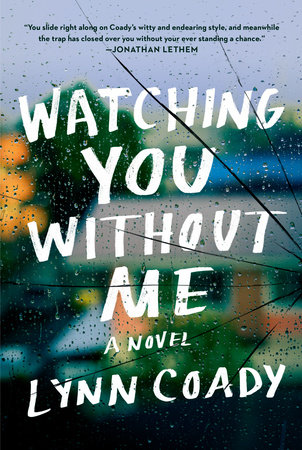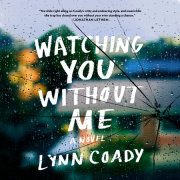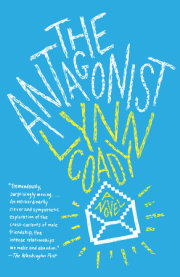1
I was in my mother’s room when the screen door opened and a man started to yell. It was so unexpected and disorienting that for a second I didn’t even know where I was. Then I glanced at the digital clock on the nightstand, with its red, oversized display for aging eyes, and remembered I’d been in here, kneeling at her empty bedside, for over an hour. I was supposed to be boxing things up, but mostly I’d spent the time laying various items across the bed and randomly smelling them.
Hullo there! How’s my girlfriend?
That was what he’d shouted, and now I could hear Kelli from her perch in the living room, babbling something pleased in reply. There was no reason to be alarmed. It was someone Kelli knew, therefore some appointment I must have overlooked in the schedule. The schedule was kept inside a chewed-up-looking file folder called Kelli’s World! (with a heart above the i), which my mother had maintained over the past few decades, and which I was only now beginning to successfully decode. In the numb and frantic days after my arrival, Kelli’s World! had been both blessing and curse. There’d been so much to do and so much to cancel—including appointments I canceled and then realized I needed, so had to call back and apologetically reschedule. Kelli had, for example, back-to-back dentist and dermatologist appointments that inconveniently fell on what it was clear would be my mother’s final days—those appointments I canceled, obviously. But I ended up rescheduling Kelli’s “friendship circle” at the community center, as much of a pain as it was to drive her there and then back across the bridge to the hospital. It was just that I’d realized that the friendship circle would allow me the opportunity to actually be alone with my mother for the first time in I didn’t know how many years. An opportunity I figured I’d better seize.
After she passed, the schedule just kept right on rolling. There’d been the five-on-the-dot arrival of the cheerful silver-haired couple from Meals on Wheels—not just every week, as I assumed when I saw the notation in Kelli’s World!, but every night. In the days leading up to the funeral, the “Wheelies” (as the couple very much enjoyed referring to themselves) had saved my life with their standing order of two blandly fragrant trays—one for Kelli and one for Irene—the second of which, because it was put in front of me, it occurred to me that I should eat. But after the wake, Irene’s refrigerator had been bursting with casseroles and the leftovers of casseroles. We were good for food, and the relentless cheer of the Wheelies, as much as Kelli thrilled to their arrival every evening, was becoming something I had to gird myself against. So pretty soon I canceled the Wheelies too. I figured I could handle the evening meals well enough until I figured out what I was going to do with Kelli.
Big Bean! Howdoya do, whaddya say, whaddya know?
The man sounded louder now, more inside than out. I stood up, feeling annoyed with myself because the voice had startled me so badly. You’d think I would be used to the constant intrusions by now—the flurry of hot and cold running caregivers my mother had put in place once she received her ultimate diagnosis. Kelli’s bathers, for example. My mother used to bathe Kelli herself, but it must’ve become too much for her at some point, because now she had bathers turning up every other day, at all hours, sometimes rapping on the door first thing in the morning, calling to my sister through the screen, was she ready for a nice shampoo? To be fair, the first morning this occurred also happened to be the first day the sun had risen without our mother in the world, so there hadn’t been much sleep the night before. I should have been ready for it, the tap-tap-tap at the door, but Kelli’s World! had been reading like hieroglyphics to me around then and the banging noise had brought me lurching from the bathroom wild-eyed, as if about to face a firing squad, toothbrush poking from the corner of my mouth like a final cigarette.
But once I understood that these invasions had my mother’s stamp—had been scheduled and approved by Irene herself—it was hard to feel aggrieved.
It was also hard to feel aggrieved at the sight of Kelli, always over-joyed at the arrival of her bathers, rocking and smiling, repeating their names so happily and incessantly you can bet I learned them pretty quick myself. So far there’d been Ruby. Gisele. Brenna.
But now it was—
TrebieTrebieTrebie. That’s Trebie. Kelli knows Trebie. Followed by a stream of giggles—her distinctive heh-heh-heh that properly belonged to a villain from a Scooby-Doo cartoon.
’Course you do! To know me is to love me!
Kelli kept chattering away as I came down the hall, repeating the new name in the rapid-fire way she had when something got her excited. HiTrebieHiTrebieHiTrebie.
My sister only has a few things she likes to say—her “catchphrases,” my father used to call them—so when they change, when you hear Kelli uttering something entirely new, it feels odd, like a cool hand landing on your shoulder out of nowhere. Like when you know a stranger’s in the house because the air has shifted with an influx of new pheromones, the dust eddies suddenly swirling around in entirely different formations.
Of course, there was a stranger in the house. Besides me, I mean.
He was my sister’s walker. Every Tuesday and Friday at ten in the morning, Trevor and Kelli took a poky, meandering turn around the neighborhood together. He’d been on vacation, he explained, which was why we hadn’t seen him before now. And which was why Gisele had been the one walking Kelli the previous week.
Nothing in Kelli’s World! had told me to expect a man. The bathers were all women, and the silver-haired Wheelies had operated according to a quaint boy/girl protocol: he stayed with the car while she knocked lightly, announced herself with a musical call of Din-din!, and set a tray before my vibrating-with-happiness sister. Later, as I was looking over Kelli’s World!, the only notation I could find on Trevor’s Tuesday and Friday mornings were the letters BL—Irene’s abbreviation for Bestlife, the home care agency she used.
He didn’t wear scrubs—none of the Bestlife people did—but if he hadn’t told me he was a worker, I probably would have assumed it. There was something about his stance, in particular: I am professional, it assured me; sanctioned. He’d also figured out a way of dressing that spoke of an office issuing orders somewhere. I think it was in the colors he chose: light khaki pants, a creamy yellow T-shirt, sunny and bright to distract from his dual vocational gloom clouds of illness and infirmity, pulled over muscles that had been sculpted just enough to let you know they were there. Gingerish hair buzzed down to bristles. Of course, the clipboard was the accessory that put the whole outfit over the top.
He still had a grin on his face when I arrived at the top of the stairs, the playful grin he wore to banter with Kelli. But his mouth went slack and round at the sight of me, and for a moment he looked irritated by his own confusion. I gave him an apologetic smile. It was clear that no one had told him of our mother’s death.
Copyright © 2020 by Lynn Coady. All rights reserved. No part of this excerpt may be reproduced or reprinted without permission in writing from the publisher.






